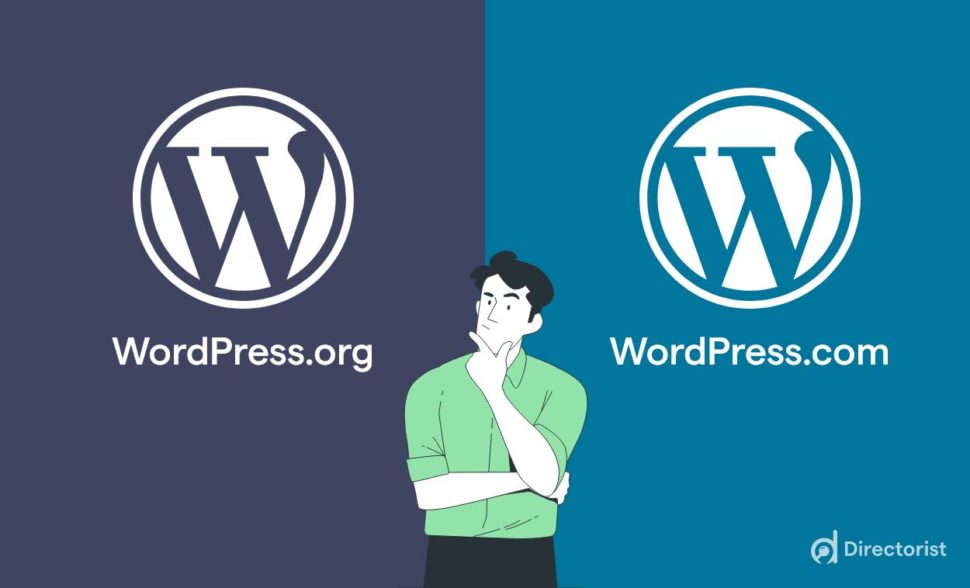Contents
- A Brief to WordPress.org
- A Bit About WordPress.com
- How to Choose the Right Platform for Your WordPress Directory Website?
- What Keeps WordPress Org & . Com on Different Poles?
- Common Myths About WordPress.com Vs. Self-Hosted WordPress Sites
- Can I Monetize Free WordPress.com Website?
- Closure on WordPress Org vs Com
WordPress Org Vs Com: Which One Is to Choose for Your Directory Business in 2025?
Imagine, you’re standing at the crossroads of your digital presence, with two paths laid out before you. On one side, you see WordPress.org – the powerhouse platform beloved by developers and website builders around the world. On the other side, you see WordPress.com – the sleek and streamlined version of the platform that promises ease of use and convenience.
Both paths seem equally enticing, yet distinctly different. Which one do you choose for your directory business? It’s a decision that could make or break the success of your online presence. So, get a cup of hot coffee and ready for a dramatic ride as we explore the differences between WordPress.org and WordPress.com, and help you make the right choice for your business.
A Brief to WordPress.org

WordPress.org is a self-hosted platform that you download and install on your own web server. This gives you full control over your directory website and its content. You can install any plugins or themes you want, and you have the ability to customize your directory website to suit your needs. This is where you can find information and support for WordPress. You can also use it to connect with other WordPress users and to access free plugins and themes.
A Bit About WordPress.com

WordPress.com is a hosted platform that provides you with a free website domain name and hosting. This platform allows users to kickstart a site absolutely free of cost. However, users can scale up to custom-paid options whenever they need to do so. The more about it, we will quote in the later lines.
How to Choose the Right Platform for Your WordPress Directory Website?

When you are starting a business directory website on WordPress, you will need to choose between WordPress.org and WordPress.com. Both of these platforms are owned by the same company, but they have different vibes. It’s no wonder that most people especially beginners circle a question around their brains about which one is the right deal.
So, if you’re reading this, we assume you’ve got the same question in your mind. You’re probably confused about which one to choose. Let us give you a roundup of exactly what you need to consider before diving into them.
Cost

Cost is an important driver that can easily pull you to choose one option over the other. On WordPress.com, the cost drives from free to $59/month while it ranges from free+ hosting service provider fee on WordPress.org.
Monetization
If you create a directory website targeting for-profit areas of business, then the monetization option comes to the screen without any doubt. Before leaping into a platform, learn first which platform broaches up the more ways to monetize your site. Once you have learned, you can easily leave with a choice.
Allowing plugins

Whatever you choose as your website platform, make sure it allows you to install any plugins based on your preference and requirements. Because adding plugins will enhance the usability and hike up the user experience.
Backup & storage
This option tremendously makes sense for directory website owners. Because, how a site moves on depends on the storage capacity of its platform. Hence, before choosing a platform for your WordPress website, be sure your next platform has enough storage to host enough necessary data.
What Keeps WordPress Org & . Com on Different Poles?

It goes without saying that both platforms are famous for their unique usability and user-friendliness. However, there is still an unsettled dispute over WordPress.org and . Com. Let’s see how they overshadow each other.
1. Ease of use

Needless to say, user-friendliness is the first option that people come up with while thinking to build a directory website on WordPress. There are two platforms with the same pedigree but strikingly different from each other. If we talk about simplicity and extreme ease, then WordPress.com will tower over WordPress.org. You just need to go for the register option and follow a few simpler steps that drive you to the ultimate site. Finally, choose your website type, import a theme, and configure just according to your needs.
On the other way round, WordPress.org drives you to purchase a domain name and hosting. Then install the WordPress software on your hosting service provider’s dashboard.
(Bonus Tips: you can purchase hosting and a domain name from renowned brands like Bluehost, Kinsta, and Cloudways. They are always a step ahead to stretch their hands towards their customers with a swarm of benefits.)
However, you find the dashboards of these platforms look alike when you will be working with them. But, in features, WordPress.org will run rings around WordPress.com which comes up with a little number of features. Finally, managing a site under WordPress.com is much easier than that of WordPress.org but the latter one puts a step ahead of the former one for beginners.
2. Technical support

As you grow with your WordPress site, many technical issues fall on your way to growth. In this case, you need technical support from the experts.
With WordPress.com, there is a tunnel to import varied levels of technical support based on your package. However, the live chat facility is only limited to the premium plan. You can have limited access to technical support with a free plan though there you find a knowledge hub enriched with necessary articles.
On the other side of the field, WordPress.org doesn’t give you room to enjoy dedicated technical support in one or the other way. At most, you can read out the provided documentation. That’s it.
3. Customization possibilities

Plugins and themes are the two key punchers to customize a WordPress directory website exactly the way a user wants. More fortunately, WordPress.org users can access many both free and premium themes and plugins in the repository.
On the flip side, with WordPress.com, you can’t configure your site under a free plan just because you aren’t allowed to use any plugin or theme in any case. If you scale up to the business plan, then you are more likely to use advanced design customization features to give your site the exact picture that you set in your heart. But, this will be a serious problem for the low-budget sites to enjoy scalability.
4. Security

Both platforms are vulnerable to facing security issues. Dishonest hackers can steal the information built-in on the site. These issues mostly arise just because of not using the updated version of the software. Also, using third-party themes and plugins can be a culprit to bolster the arrival of these issues.
With WordPress.com, your site will experience automatic updates without even a bit of hassle. Surprisingly enough, the core software updates occur inside the process.
Contrastingly, you won’t find WordPress.com updating its software automatically. Instead, you need to give the thumbs up to these upgrades. Moreover, you have to deploy closer eyes to the continual changes.
Finally, it’s evident that if you don’t have enough time to monitor your site on the regular basis, then you should avoid the habit of using WordPress.com.
5. SEO

Without even a single question left, the SEO option will let you decide which platform you should use to build your site. SEO is a way to get your directory website to rank higher on search engine results pages for specific keywords. If you want your site to be found by more people, SEO is one of the most important things you can do.
With WordPress.org, you can have access to almost all SEO strategies with extreme ease. The popular SEO plugin, Yoast is compatible with this platform and you can use this tool to optimize your site and targeted keywords exactly the way you want.
Wait! The ball is still rolling on. There you find the Google Analytics option to use for excavating the data about your sites, for instance, the conversions, traffic sources, the best and worst-performing content, etc.
In this area, WordPress.com drops the ball to WordPress.org because the previous one is up to limited SEO options. The Google Analytics integration is a big ‘NO’ without a premium plan. You need a business or higher plan to introduce your sites with more SEO options. Meaning, that under cheaper packages, it’s next to impossible to briefcase your directory listing websites atop the search engine pages under WordPress.com.
6. Monetization options

Monetization options are vital for any type and size of website. Many people even think that the .com website ships with many monetization options but in reality, there is no healthy option that counts this platform to be prioritized except WordPress’ official advertising network.
On the other pole, you have various monetization options at your hand, for example, you can run your own ads campaign which generates money. Other options are paid ads, AdSense, etc. In this field, the .org takes the edge.
Common Myths About WordPress.com Vs. Self-Hosted WordPress Sites
There are many myths and misconceptions about WordPress.com and self-hosted WordPress sites. Here are some of the most common.
- Myth: WordPress.com is the same as self-hosted WordPress.
Fact: WordPress.com is a hosted platform that is managed by Automattic, the company behind WordPress. Self-hosted WordPress, on the other hand, is the software that you can download and install on your own web hosting account.
- Myth: WordPress.com is not customizable.
Fact: While WordPress.com has some limitations compared to self-hosted WordPress, it is still very customizable. You can choose from a variety of themes, customize your site with widgets and plugins, and even edit the CSS of your site.
- Myth: Self-hosted WordPress is more secure than WordPress.com.
Fact: Both WordPress.com and self-hosted WordPress can be secure if you take the proper precautions. WordPress.com takes care of security updates and backups for you, while self-hosted WordPress requires you to take care of these things yourself.
- Myth: Self-hosted WordPress is more expensive than WordPress.com.
Fact: While self-hosted WordPress does require you to pay for web hosting and a domain name, it can be more cost-effective in the long run, especially if you have multiple sites. WordPress.com has a free plan, but if you want to use your own domain name or access more features, you will need to pay for a premium plan.
- Myth: WordPress.com is only for beginners.
Fact: WordPress.com can be used by anyone, regardless of their level of experience with WordPress. Many professional bloggers and businesses use WordPress.com for their websites.
- Myth: Self-hosted WordPress is more difficult to use than WordPress.com.
Fact: While there is a learning curve with self-hosted WordPress, it is not necessarily more difficult to use than WordPress.com. With self-hosted WordPress, you have more control over your site and can customize it to your liking.
Can I Monetize Free WordPress.com Website?
Yes, you can monetize a free WordPress.com website, but there are some limitations and conditions that you need to be aware of.
Firstly, if you are using a free plan on WordPress.com, you won’t be able to place your own ads on your website. WordPress.com displays its own ads on free websites to support its platform, but you can upgrade to a paid plan to remove these ads.
Secondly, you can use affiliate marketing on your WordPress.com website, but there are some restrictions. WordPress.com allows affiliate links as long as they are not for spam or illegal activities, and you need to disclose your affiliate relationship with your readers.
Thirdly, you can sell products and services on your WordPress.com website, but again, there are some limitations. WordPress.com allows you to use third-party payment processors like PayPal, but you can’t use the built-in WordPress.com payment system. You also can’t sell digital products like eBooks, software, or music on WordPress.com.
In summary, while you can monetize a free WordPress.com website, you may have more flexibility and options if you upgrade to a paid plan. It’s important to read and follow WordPress.com’s terms of service and guidelines to ensure that you are in compliance with their rules.
Closure on WordPress Org vs Com
We hope that you have already understood the difference between WordPress org and WordPress .com!!! Now, it’s up to you which one you should pick for your business. To our eyes, if you want to invest a very little amount of money in your business, then taking the shadow of WordPress .com will be the better option to take on your shoulder. In contrast, if you want to spend more bucks on your business and take full control over your website, then embarking on WordPress org will give you the juice of betterment.
Finally, if you have any more confusion with the term “WordPress org vs com”, then don’t hesitate even a bit to put some valuable words in the comment section below. We will be happily reaching out to you with the relevant answers.
If you liked our posts, don’t forget to subscribe to our blog so that we can notify you once any post is published. Directorist is now on Facebook, Twitter, and LinkedIn! You can also join the Directorist Community for sharing your thoughts and experiences relating to the directory niche. Come and join us to see what we’re up to.
2 Comments
Leave a Reply
You must be logged in to post a comment.






Maria Khan
May 11, 2022Your post is very helpful for me. The concept of WordPress.org and WordPress.com is clear to me.
Md. Hamim Khan
May 12, 2022Thanks a lot